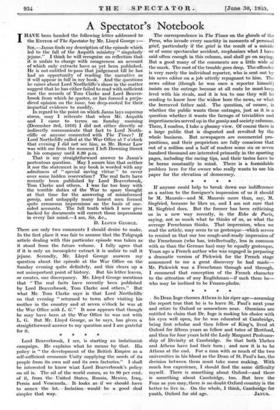The correspondence in The Times on the ghouls of the
Press, who invade every sanctity in moments of personal grief, particularly if the grief is the result of a suicide or of some spectacular accident, emphasizes what I have said.often, enough in this column, and. shall go on saying. But a good many of the comments are a little wide of the mark. The root of the trouble goes deep. The-offender is very rarely the individual reporter, -who is sentout by his news editor on a job utterly repugnant to him-. The news editor (though he was once, a reporter himself) insists on the outrage because at all costs he must keep level with his rivaLs, and it is ten to one they will be sending to know how the widow bore the news, or what the bereaved father said. The question, of -course, is whether the public wants these outrages, just as it is a question whether it wants the farrago of trivialities and impertifiencies servecLup in the gossip- and society columns. There, I confess, I take a-gloomy view. Of course there is a large public that is disgusted and revolted by the whole business. But newspapers . are commercial pro- positions, and their proprietors are fully conscious that out of a million and a half of readers some six or seven hundred thousand are interested primarily in. the ,sporting pages, including the racing tips, and..their tastes have to be borne Constantly in mind. There 'is a formidable problem here for the owner who really wants to use his paper for the elevation of democracy.
* * * -*










































 Previous page
Previous page